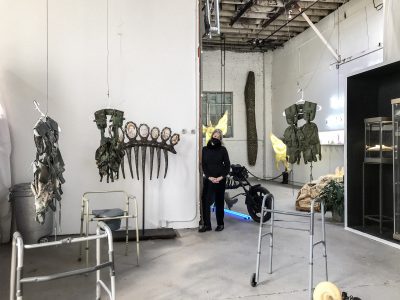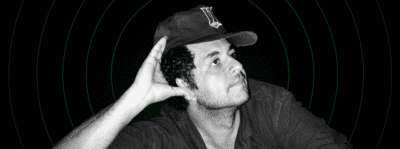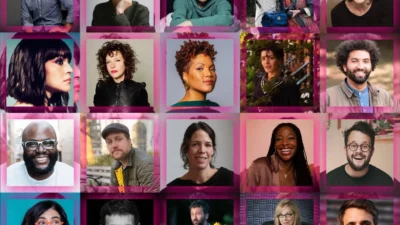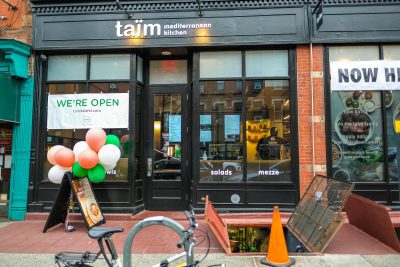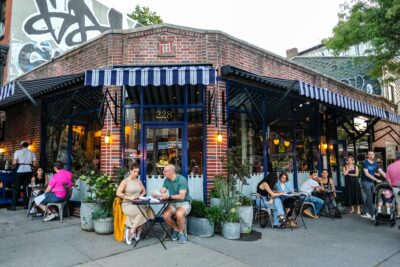"Minor League Baseball" by Nathan Congleton is licensed with CC BY-NC-SA 2.0.
After a rollercoaster of a year, the Cyclones are ready to play ball
The 2020 minor league season was canceled due to Covid, but the championship 'Baby Bums' return to the diamond on May 4
MCU Park was alive on Sept. 10, 2019. Players and coaches shared hugs and posed for pictures. In untucked, dirt-stained jerseys, they hoisted a trophy and shook champagne bottles—they had just captured the New York Penn-League title. The “Baby Bums” were neither babies nor bums. They were champs.
Of course, nobody in 2019 would have imagined that was the last night of minor league action MCU Park would see for a year. A chance to defend the title evaporated, along with millions of other dreams across the world: In 2020 the Cyclones organization fought instead for its very existence and the health of its employees. Coronavirus had struck and the season was canceled.
Still, the year was hardly boring: Major League Baseball’s restructuring of the minors resulted in 42 minor league squads losing affiliation with the majors. (MiLB now has a total of 120 teams—four per MLB franchise.) All teams were financially ravaged by the pandemic.
The Cyclones fared better than most. While the conventional wisdom was that the Brooklyn team would remain affiliated with the New York Mets, fans were nonetheless relieved when it was made official. Formerly of the now-defunct New York Penn-League—a Class A Short-Season league—the Cyclones were elevated to the new High-A East as a result of the restructuring. This surprised baseball insiders, who had predicted the Brooklyn club would replace the Binghamton Rumble Ponies as the Mets’ Double-A affiliate (Binghamton remains the Double-A affiliate).
Meanwhile, MiLB teams across the nation laid off scores of employees. The Cyclones, a stable franchise and perennial leader in New York Penn-League attendance, was one of the few teams able to keep all of its full-timers. The staff, though, endured modest pay cuts of 5, 10, or 15 percent, depending on salary.
“Human resources was terrific,” says Keith Raad, who, as the voice of the team, calls Cyclones games on the radio. “There were outreach groups that checked in with us regarding our health and otherwise. And throughout the pandemic, I’ve been tested frequently for Covid.”
Raad went months without putting on the headset. When restrictions eased this past fall and winter, he found himself back in the booth, calling games for various Wagner College sports, and spotting for Army football announcer Mark Fratto at West Point. He even helped produce Howard University men’s basketball games for ESPN2.
“I’m in no matter what,” he says “I never think about doing anything different. In this business, things can get rough financially at times. But if I had another career, I would always be thinking about baseball.”
The show must go on
Meanwhile, minor league front offices nationwide found creative ways to make money and facilitate fan interaction. Some franchises turned their stadiums into large restaurants with curbside pickup (some ballpark food was delivered by mascots and workers), as a way to keep their kitchen staffs employed and remind fans they still existed. Others hosted fireworks extravaganzas, high school graduations, sports award ceremonies, or drive-in movie nights. It was manic marketing to avoid bankruptcy.
MCU Park was an alternate training site for the Mets last summer, limiting the Cyclones’ use of their home. Nevertheless, the team remained engaged with its fans as well. Through social media and video calls, the Brooklyn club held virtual “garage sales,” promotional giveaways, and bingo and trivia nights. Other entertainment included “Cyclones Cinema,” in which a player would watch a classic movie for the first time and live tweet his reaction.
In the fall, fans could order “mystery boxes” filled with Cyclones paraphernalia—bobbleheads, mugs, and jerseys—and then pick them up at the stadium. To connect with the surrounding community, the team launched its “Spread the Yum” campaign, an effort to support local restaurants.
The Cyclones even produced a Facebook video series. Titled “Slice of Life,” the podcast-like production began at the start of quarantine and extended into the summer. Each episode included Raad and Billy Harner, the team’s communications director. They discussed baseball, current events, pop culture, viral videos, and personal memories.
“The idea for ‘Slice of Life’ came from him,” Raad says. “He was home with his kids and just saw a lot of bad and sad news about everything happening in the world. We wanted to promote something good, something people could smile about while stuck inside. … And the name obviously came from the connection between Brooklyn and pizza.”
Raad and Harner returned in February with “Amazin’ Starts Here,” a podcast dedicated to the Mets farm system. The show has already featured interviews with top Mets minor league prospects, coaches, executives, and experts.
Despite the team’s efforts to keep in touch with fans, nothing beats the ballpark experience, especially at Coney Island. In addition to fun promotional dates such as its popular “Seinfeld Night” and “Brooklyn Amazins Night,” Raad simply misses “the life in the stadium, the people, the sound of the crowd, and putting on a show every night.”
Rounding the bases
All of that will return soon. The Cyclones’ first game is set for May 4 and their home opener will be May 18. The team expects to have limited capacity at 7,000-seat MCU Park to ensure social distancing, but guidelines are subject to change as the season progresses. During a normal year, the High-A season would begin in April, but MLB delayed the start of the minor leagues to limit the number of players at preseason camp and lower the risk of a viral outbreak. Therefore, High-A teams are planning for 120 games instead of the standard 140.
Even with the 20-game decrease, the Cyclones will be on the diamond more than before—the Brooklyn club played only 76 games per year, half of them at Coney Island, as a short-season team. The High-A regular season will end in September, which is the norm.
The “Baby Bums” will be a member of the High-A East’s North Division, along with the Aberdeen IronBirds (Baltimore Orioles), Hudson Valley Renegades (now affiliated with the New York Yankees), the Jersey Shore BlueClaws (Philadelphia Phillies), and the Wilmington Blue Rocks (Washington Nationals). Aberdeen and Hudson Valley are familiar foes from the New York-Penn League, while Jersey Shore and Wilmington will be new opponents.
While the official roster has yet to be released, the new coaching staff has been made public: Ed Blankmeyer, the former St. John’s Red Storm baseball coach, will serve as the 12th manager in Cyclones history. Blankmeyer was hired in early 2020, but never got his shot to manage Brooklyn due to the MiLB season cancellation. Instead, he helped run the Mets’ alternate training site at MCU Park last summer. His bench coach will be Mariano Duncan, who played 12 seasons in The Bigs. New Yorkers may recognize the name—Duncan was on the World Series-winning 1996 Yankees team that featured another Mariano.
“High A will be a great brand of baseball, although there will be some cold games due to the longer season,” says Raad. “We all felt pretty confident that we would remain affiliated with the Mets. But the timing and trickling out of the restructuring news over social media made us want to know more so we could immediately know how to plan. It will be a quick turnaround into this season, but we are very excited.”
Veteran New York City journalist Gersh Kuntzman, an avid Mets and Cyclones fan, understands both the pros and cons of MLB’s remodeling of the minors.
“It’s bittersweet,” he says. “Minor league baseball is great for families since it isn’t expensive and you can sit close to the field. Over 40 towns lost the most important part of their summers.”
Kuntzman, who edits Streetsblog New York, believes the move to High A will benefit the team and its fans.
“It will be high-quality baseball and one step closer to the majors,” he says. “The Cyclones have always sent great talent to the higher levels and this will only continue that trend.”
When the club debuted in 2001, Kuntzman expected a “hokey” operation and experience. To his surprise, it was more of a corporate atmosphere.
“The Cyclones never had that Middle America feel,” he observes. “Sometimes it felt like a company that wasn’t connected to the rest of Coney Island. And that’s because the Mets owned them, not a smaller group or family.
Kuntzman appreciates the “humanity of baseball that only real fans can understand.” He’s not alone. Brooklyn is home to many “real,” die-hard fans, which Raad recognizes.
“We love the fans and they love us,” Raad insists. “It was a borough that went nearly half a century without pro baseball. There is a big personality here.”
After a 603-day hiatus, Brooklyn baseball will be back.
You might also like 

















